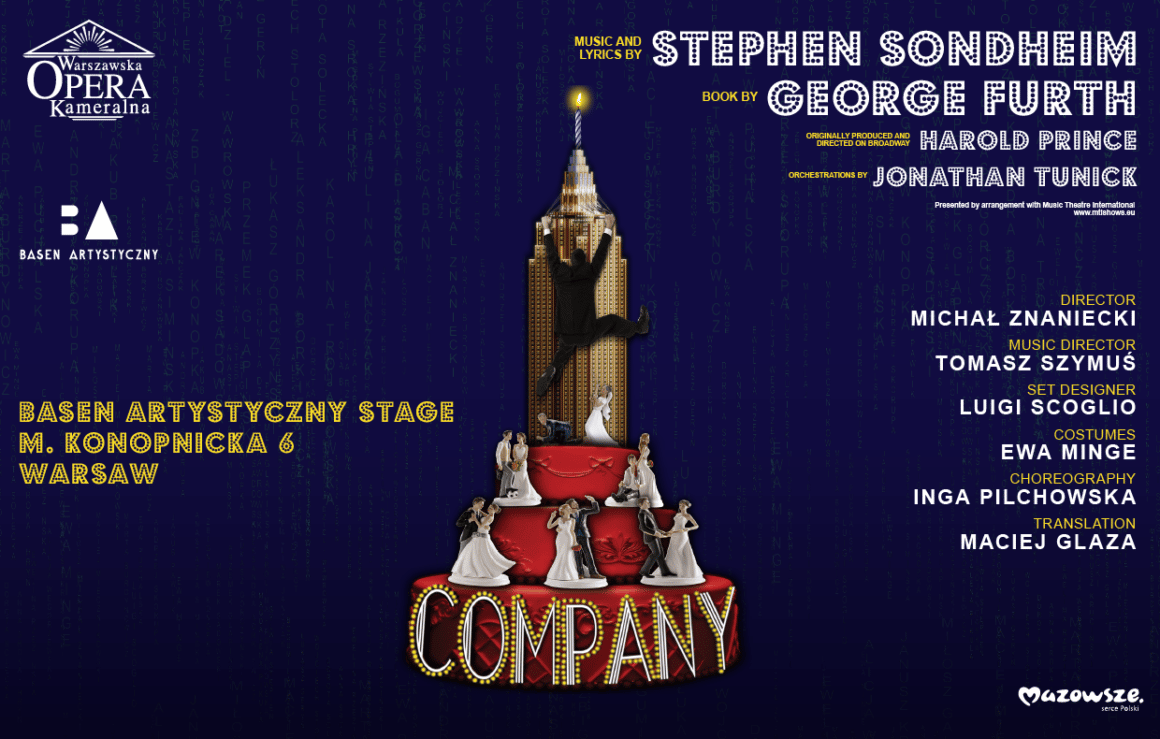CAUTION! During the performance, short-term strobe lights will be used twice.
Basen Artystyczny Stage
Stephen Sondheim
Company
Libretto | George Furth
Translation | Maciej Glaza
English subtitles
Duration: 150 min. + 30 min. Entr’acte
Music director/conductor: Tomasz Szymuś
Staging and director: Michał Znaniecki
Set designer: Luigi Scoglio
Costume designer: Ewa Minge
Choreographer: Inga Pilchowska
Lighting director: Dawid Karolak
Multimedia: Karolina Jacewicz
CAST:
ROBERT/BOBBY: Rafał Supiński
HARRY: Maciej Miecznikowski
SARA: Marta Burdynowicz
PAUL: Andrzej Skorupa
AMY: Anastazja Simińska
JOANNE: Alicja Węgorzewska
SUSAN: Anna Sroka-Hryń
LARRY: Zbigniew Konopka
PETER: Przemysław Glapiński
DAVID: Wojciech Stolorz
JENNY: Bogumiła Dziel-Wawrowska
APRIL: Aleksandra Borkiewicz
KATHY: Paulina Janczak
MARTHA: Iga Caban
ANGEL: Paulina Łysikowska-Dorocka
Vocal Ensemble of the Warszawska Opera Kameralna
Chorus Master – Krzysztof Kusiel-Moroz
Ballet Company
Dominika Lewandowska, Joanna Lichorowicz-Greś, Paulina Wojtkowska, Marta Żabka, Zyta Bujacz-Dziel, Ewelina Kruk, Joanna Ziemczyk
Musicians:
Mariusz Mielczarek – saxophone, Paweł Gusnar – saxophone, Konrad Gzik – saxophone, Jakub Wydrzyński – saxophone, Łukasz Dzikowski – oboe, Kuba Waszczeniuk – trumpet, Andrzej Rękas – trombone, Sebastian Frankiewicz – percussion, Jan Zeyland – keyboard, Marcin Trojanowicz – keyboard, Patryk Stachura – bass, Bartosz Szetela – bass, Joanna Pomykała – violin, Jacek Wachnik – violin, Maja Wachnik – viola, Karol Wachnik – cello
PHOTHOS FROM THE PREMIERE
PHOTHOS FROM THE 2’nd PREMIERE
Company – a musical, that wonderfully stands the test of time
“Company” is an iconic American musical, based on a libretto by George Furth, which, compared to the entire enormous oeuvre of Stephen Sondheim, is so special that both the music and the text are written by the author of the work. Moreover, it is a musical considered to be one of the first socially engaged, it hasn’t lost any relevance for half a century since its premiere in 1970. It is worth knowing that back then, the show received 14 nominations for the most important Broadway Tony Award, ultimately winning 6 statuettes. Jonathan Mandell, one of the most influential critics of Broadway, considered “Company” a work filled with the best lyrics, and when reviewing the December revival in New York (2021, Ethel Barrymore Theatre, fourth New York revival in musical history), he was tempted to say: It contains more than a dozen songs with among the cleverest lyrics in the history of musical theatre. The score is exquisite.
The “Company’s” story revolves around Robert, a handsome and popular single man, five married couples who are his best friends, and three of his girlfriends. While the classic musical is built on the basis of a homogenous plot, and we witness a linear development of the action, in here we get independent threads closely related to the individual marriages or main character’s partners, and all of them are linked to the celebration of Robert’s next birthday. As Sondheim put it: They are middle-class people with middle-class problems.
Charles Isherwood of “Broadway News” goes further in his interpretation:
Broadly speaking, Company is a musical meditation on emotional ambivalence, the sense that “the road you didn’t take,” to quote a Sondheim lyric from another show, might have been preferable to the one you are on. Virtually all of the married characters raise questions about decisions they made — specifically the choice to commit their lives to their spouses — and for most of them, the answers to those questions will always remain elusive or ambiguous.
Whenever a musical returns to theatre’s repertoire, whether in the United States or in London’s West End, it is astonishing with its topicality and the everlasting nature of human dilemmas. What was formally shocking in 1970, since the musical defied the convention by being a series of seemingly independent one-act plays sewn together, is today its trademark. The main character weighs the advantages and disadvantages of his inner circle’s relationships, gradually coming to the conclusion that there are more reasons to open up to love and commitment than to remain alone. So does optimism ultimately win? With this question, the viewer remains alone.
***
The performance is perfectly produced – musically, danceable and dramatically. Broadway in Warsaw.
e-teatr, Bronisław Tumiłowicz
Musically, Bobby’s vocal parts and group scenes are extremely distinguishing. The ensemble playing live music is doing great.
Teraz Teatr, Marta Gaik



















